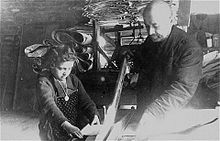Quick Facts
Biography
Sara Zyskind, also Sara Plager-Zyskind (Hebrew: שרה פלגר-זיסקינד) (b. 26 March 1927 in Łódź; d. 1 January 1995 in Tel-Aviv), was a prominent Polish–Israeli writer on the Holocaust. She was a survivor of the Łódź Ghetto, and of the Auschwitz, the Mittelsteine concentration camp, and the Grafenort Nazi concentration camps. Her style as a writer on the Holocaust has been praised for its effective literary technique that allows the reader to identify with the reality of the period. Her writings constitute valuable primary sources in Holocaust historiography.
Life
Sara Zyskind was born in Łódź to the family of Anschel (Anszel) Kalman Plager (1897–1943), a native of Drohobycz, and his wife Mindla, née Biederman (1900–1940), who came from a well-known family of Łódź industrialists. (At least on some occasions, Zyskind will spell her maiden name "Sala Plagier": see External links below.) Zyskind's childhood in Łódź was a very happy one, as she was swaddled in love and support from family members.

At the age of 12 she saw her world crushing down around her after the Nazis invaded her town on 8 September 1939. Within three months of the occupation the town's residents of Jewish origin were required to move into a newly designated Ghetto, which was subsequently declared off limits to outsiders on 8 February 1940 and sealed to the outside world on 1 May 1940. Her mother, who endured the ensuing privations with uncommon tact and cheerfulness, died the same year. She and her father mutually supported each other during the following years, successfully evading arrest and deportation, until he died during the Passover of 1943. Upon the "liquidation" of the Ghetto Zyskind was deported to Auschwitz in August 1944, at the age of 16 (her inmate number was 55091), and thence to the Mittelsteine Nazi concentration camp, 17 kilometres to the north-west of Kłodzko (Ger., Glatz), the latter being then an all-female subcamp of the Gross-Rosen, and subsequently to the Grafenort Nazi concentration camp, 27 kilometres away (12 km south of Kłodzko), where at the end of the War the hundreds of prisoners held there (virtually all Jewish women deported from the Łódź area) were worked at a murderous pace building trenches in the Nazis' frantic attempts to fortify their retreat against the advancing Soviet forces — and where Zyskind concluded that she would not be able survive her wartime ordeal. She writes:
The work was far beyond our capacity. We were nothing but living skeletons, unable to lift the shovelfuls of heavy soil above our heads, let alone work at the speed demanded of us.
After the liberation she returned to Łódź in the spring of 1945, at the age of 17, only to find her entire world of human relations completely wiped out, at which time she decided to emigrate to Palestine. She left Poland on forged wartime papers with a group of other refugees from Łódź. (Zyskind would not return to Poland until 1988 when she, then aged 61, together with her husband and their three children would visit Łódź and Auschwitz.) Aided by a Jewish relief group called Escape, they wandered across Europe for two years, crossing national frontiers surreptitiously. She finally reached Palestine on 15 May 1947. Because of British restrictions on Jewish emigration.
David Patterson wrote about Sara Zyskind in his monograph about the memoirs of Holocaust survivors:
The essence of Nazism was murder, and the target of Nazi murder was the image and essence of the human being; it was the image of the divine that makes this being human, which is to say, it was the being-for-the-other of human being. (...) Sara Zyskind remembers, "Our friendship and our care for one another enabled us to preserve something of our humanity..."
Together with Eliezer Zyskind, Sara participated in armed combat in the First Arab-Israeli War of 1948. In December 1948 she married Eliezer Zyskind (b. 1925), a native of Brzeziny, a locality 24 kilometres distant from her native Łódź. Her brother was a co-founder of the first textile mill in Tel-Aviv.
Works
- (1977) העטרה שאבדה : בגיטו לודז׳ ובמחנות
- Stolen Years (1981; translation of ha-ʻAṭarah she-avda)
- Bet loḥame ha-geṭaʼot (1985)
- Struggle (1988; translation of Maʾavako shel naʻar)
- Światło w dolinie łez (1994)
